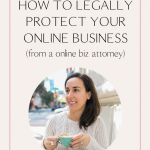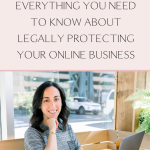Entrepreneurs are often hyper-focused on high-level visions, creativity, and plans that will propel their business to better serve the masses. While business owners can do a lot, we can’t do everything. One thing you definitely should not leave up to chance is legally protecting your online business.
Sam Vander Wielen spent 5 years as a corporate attorney and litigator before becoming an online entrepreneur. Today, she helps other online business owners learn how to protect and grow their businesses through legal templates. Sam joins us in this episode of Her Life By Design, making overwhelming legal jargon a lot easier to digest.
How to Legally Protect Your Online Business
Whether you’re a blogger or picking up an online side hustle, it is important to get your legal bases covered. If you’re intimidated by the legal process, you’re not alone. Sam recognized this problem and she’s here to break down the most important legalities of running an online business. Let’s start with the 3 documents you need to have on your website to protect it.

Privacy Policy
A Privacy Policy page details what you do with your site visitor’s information and collected data. This page is a must for every blogger, even if you aren’t collecting emails. Data is collected at all times on your blog if you allow comments, use Google Analytics, Jetpack, or even a third-party site. According to Sam, the Privacy Policy page “is the most important page because it is legally required.”
Website Disclaimer
“The website disclaimer is the most legally important page,” says Sam. “In America, you can pretty much sue anybody for anything at any time, even if it’s not true.” Your website disclaimer protects your business from any legal claims made against you. This is especially important for influencers and bloggers since we’re often recommending products and promoting brands. To help demonstrate what your website disclaimer page is, Sam dubs it the “use at your own risk” warning.
For instance, if a reader fries her hair using a hair straightener she purchased through your recommendation, she has the right to sue. Your website disclaimer will protect you from that claim, as it is essentially your “I told you so” document.
Terms and Conditions
Sam describes the Terms and Conditions page as the “catch-all” document. It’s also what you want your clients to agree to if you’re selling digital products. The Terms and Conditions document addresses topics such as third party endorsements, refund payments, and a lot of other legalities such as copyright infringement and intellectual property.
It’s in good practice to include this page on your blog as soon as possible to protect your content.
Complying With Global Laws and Regulations
The best thing about operating an online business is that it makes you more accessible globally. Because of that accessibility, you need to be wary of laws and regulations in different parts of the world. The GDPR is an EU privacy law and general data protection regulation that your blog or website has to comply with, even if you’re operating outside of the EU.
In essence, the GDPR provides European citizens with more access and control over what happens to their personal information online. As long as your website is accessible by anyone in Europe, you must comply with it.
In the episode, Sam dives deeper into what the GDPR means and how your online business can stay in compliance with it.
Sole Proprietorship, LLC, and S Corp… oh my!
It’s important to legally protect your online business right from the start. Knowing whether to register as a Sole Proprietorship, LLC, or S Corp can be confusing. Sam dishes on what it is you need to know about all three classifications, and what the major differences are.
She explains that the biggest difference between a Sole Proprietorship and an LLC is that you’re granted limited liability protection. An LLC serves as a wall between you and your business – this means that in the case where something were to happen, your personal assets will be protected.
In the episode, Sam discusses in detail about why registering as an LLC is the way to go. She also discusses what practices influencers and bloggers should uphold when operating as an LLC .

Getting Legally Legit with Sam
Protecting your online business legally can be expensive and overwhelming. Whether you’re just starting as an influencer or you’re running a fully-established online business, getting legally legit is always your safest bet. As an online entrepreneur herself, Sam knows the ins-and-outs of protecting your business so you can grow it with confidence.
This episode will help you understand some of the most intimidating legalities concerning your online business. Sam shares so much valuable information about the must-have legal documents for anyone with an online presence, how to draft up a contract when making your first hire, copyright infringement, and filing taxes as an online business owner.
As for any influencers and bloggers, Sam also drops some helpful contract tips when it comes to negotiating and collaborating with a brand.
Drop Some Love in iTunes:
If you enjoyed this episode, go ahead and hit SUBSCRIBE. There is a new episode every Wednesday and I would hate for you to miss a thing. Click here to subscribe on iTunes.
AND if you are feeling extra generous, take a few seconds to leave Her Life By Design a review on Apple Podcasts. Or post a screenshot on your Stories with some feedback. 😊Hearing what you think about this episode and the podcast as a whole means the WORLD to me. After all, this is all for you. More reviews = more listeners = better guests & content.
All you gotta do is click here to review, click “Ratings and Reviews” and “Write a Review.” I’ll love you forever!
Relevant Links:
Sam’s website: https://samvanderwielen.com/
5 Steps to Legally Protect & Grow Your Online Business: https://samvanderwielen.com/free-workshop/
Sam’s Instagram: https://www.instagram.com/samvanderwielen/
Sam’s YouTube: https://www.youtube.com/channel/UCRvmhnGVaMbL7Jf3_MgfNiA






+ show Comments
- Hide Comments
add a comment